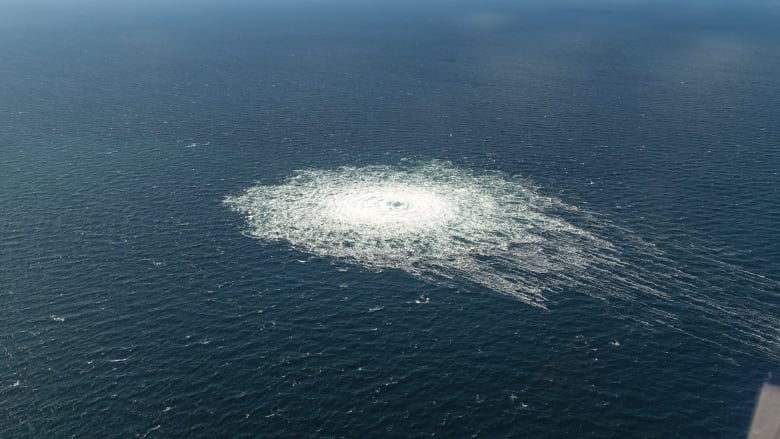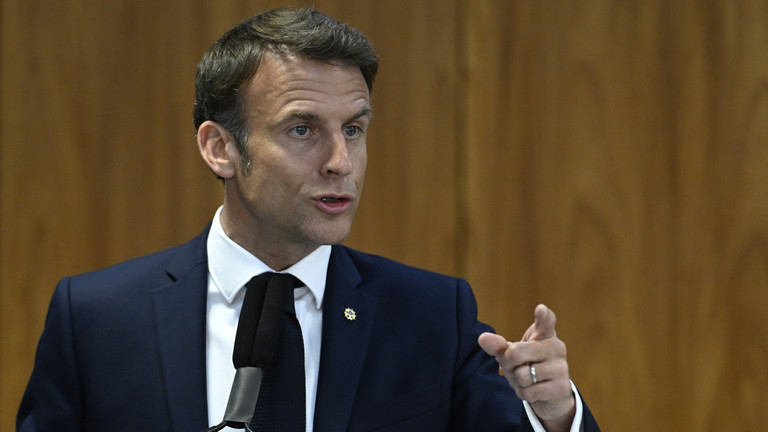This article is more than
2 year oldDenmark says damage to Nord Stream pipeline in Baltic Sea was 'deliberate'

Explosions rattled the Baltic Sea before unusual leaks were discovered on two natural gas pipelines running underwater from Russia to Germany, seismologists said Tuesday.
Danish Prime Minister Mette Frederiksen said her government regarded the leaks as the results of "deliberate actions" by unknown perpetrators, while other European leaders and experts pointed to possible sabotage amid an energy standoff with Russia provoked by its war in Ukraine.
The first explosion was recorded early Monday southeast of the Danish island of Bornholm, said Bjorn Lund, director of the Swedish National Seismic Network. A second, stronger blast northeast of the island that night was equivalent to a magnitude-2.3 earthquake. Seismic stations in Denmark, Norway and Finland also registered the explosions.
"There's no doubt, this is not an earthquake," Lund said.
Asked whether that constituted an attack on Denmark, Frederiksen replied that the leaks happened in international waters and "the answer is thus no."
Asked who could be responsible for the leaks, Frederiksen said "there is no information indicating who could be behind it."

The pipelines are not currently bringing gas to Europe as an energy standoff over Russia's war in Ukraine halted flows or never allowed them to begin.
However, gas still fills the lines, leaving open the possibility of localized environmental damage.
Polish PM slams Russia
Frederiksen was with Poland's President Andrzej Duda and Prime Minister Mateusz Morawiecki, opening a valve of a yellow pipe belonging to the Baltic Pipe, a new system set to bring Norway's gas across Denmark and the Baltic Sea to Poland beginning next week.
Morawiecki characterized the events as "an act of sabotage."
"The era of Russian domination in the gas sphere is coming to an end," Morawiecki declared, calling it "an era that was marked by blackmail, threats and extortion."
The evidence seems to point in one direction, according to Johannes Peters, the head of the Center for Maritime Strategy and Security at the Institute for Security Policy at Kiel University.
Considering "the complexity of the attacks and how difficult it is to carry out such an act of sabotage, then it's most likely that a state actor is involved," said Peters.
Trent Murray in Berlin reports on the many questions raised over sudden, unusual gas leaks from Russia's Nord Stream 1 and 2 pipelines in the Baltic Sea.
He added that there is only one country where "the possibility, the capabilities and the motivation come together. And that is obviously Russia."
The leaks, off the coast of Denmark and Sweden, raised the stakes on whether energy infrastructure in European waters was being targeted and led to a small bump in natural gas prices.
Each line of the pipeline consists of about 100,000 24-tonne concrete-weight coated steel pipes laid on the seabed of the Baltic Sea. The pipelines have a constant internal diameter of 1.153 metres, according to Nord Stream.
Sections of the pipelines lie at a depth of around 80-110 metres. The escaped natural gas is almost entirely methane, which partially dissolves in water and is not toxic. The deeper the gas is released in the sea, the higher the proportion that dissolves in the water.
Methane is the second biggest contributor to climate change after carbon dioxide. David Hastings, a retired chemical oceanographer in Gainesville, Fla., says much of the gas would rise through the ocean and enter the atmosphere. "There is no question that the largest environmental impact of this is to the climate, because methane is a really potent greenhouse gas," he said.
Read More (...)
Keywords
Newer articles
<p>Chinese officials say they "firmly oppose" the platform being divested.</p>
Apple deletes WhatsApp, Threads from China app store on orders from Beijing
Tumultuous Trump trial day ends with 12 jurors, 1 alternate selected
TikTok ban now ‘inevitable’
Ukraine ‘will have a chance at victory’ with new US aid, Zelenskyy says
Israel Launches Retaliatory Strike Against Iran
Israel Iran attack: Damage seen at air base in Isfahan
Who will be Trump’s VP? A shortlist
‘URANIUM’: Terrifying detail about Israel’s strike on Iran emerges
Netflix Password Crackdown Delivers Millions of New Customers




